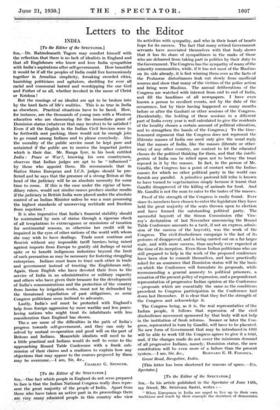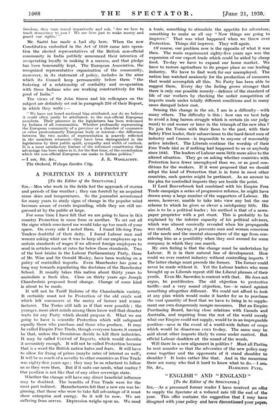[To the Editor of the SPECTATOR.] Sus,—In his article published
in the Spectator of June 14th, my friend, Mr. Srinivasa Sastri, writes :- "When Europeans in India are urged to live up to their own traditions and teach by their example the doctrines of democratio
freedom, they turn round impatiently and ask, ' Are we here to teach democracy to you ? We are here just to make money and guard our rights.' "
Mr. Sastri has made a bad slip here. When the new Constitution embodied in the Act of 1919 came into opera- tion the elected representatives of the British non-official community in India publicly announced their intention of co-operating loyally in making it a success, and that pledge has been honourably kept. The European Association, the recognized representative organization of the community, moreover, in its statement of policy, includes in the aims which its Council keep permanently before them " the fostering of a relationship of cordiality and co-operation with those Indians who are working constructively for the
good of India."
The views of Sir John Simon and his colleagues on the subject are definitely set out in paragraph 216 of their Report, in which they write :-
" We have not heard sectional bias attributed, nor do we believe it could often justly be attributed, to the non-official European members. Their presence in the legislatures has been welcomed by Indians of all communities. Whether professedly representing the European community of a province or a chamber of commerce or other predominantly European body or interest—the difference between the two modes of representation is scarcely reflected in the members returned—they have been distinguished in the legislatures by their public spirit, sympathy and width of outlook. It is a most satisfactory feature of the reformed constitution that advantage has been taken in it, for the first time, of the contribution which the non-official European can make to Indian politics."
The Orchard, Welwyn Garden City.









































 Previous page
Previous page